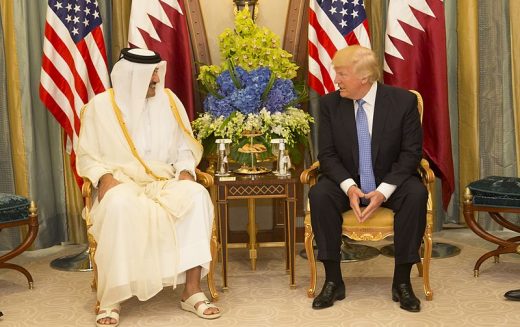Persian Gulf Feud

Riyadh accusing Qatar of supporting terrorism ignores the pernicious regional infestation of Saudi-supported extremist Wahhabism, the ideology connected to ISIS and like-minded groups.
Both countries support regional terrorist groups, both US allies, despite mixed messages from Washington on Qatar.
Secretary of State Tillerson called for “no further escalation by the parties in the region, (urging) calm and thoughtful dialogue” to resolve things, asking other Gulf states to ease their blockade, citing humanitarian reasons ignored by Washington in all its wars.
Qatar is home to the Pentagon’s Central Command, thousands of US military personnel stationed in the country. During his visit to Riyadh, Trump met with emir al-Thani, saying Washington’s “relationship (with the country) is extremely good.”
On Friday, he tone changed, calling Qatar a longtime “funder of terrorism at a very high level…Stop teaching hate. Stop the killing,” he said.

Qatar’s Sheikh Tamim bin Hamad Al-Thani meets with US President Donald Trump. Official White House Photo by Shealah Craighead.
The diplomatic standoff continues. Iran offered Qatar use of its southern ports to import needed goods. The tiny Gulf state is import-dependent.
On Wednesday, an Iranian cargo plane delivered tons of supplies to Qatar. National Agricultural Products Federation of Iran president Reza Nourani said talks are underway to export food to the nation.
It’s currently sending around 50 tons daily to the region. Some of it could be diverted to Qatar. Iranian ships can supply much more of what’s needed.
Turkey’s Erdogan pledged support for the al-Thani regime, one rogue leader supporting another.
Saudi Arabia, Bahrain, the UAE, Egypt, one of the rival Libyan regimes, the Saudi-supported Yemeni one, and the Maldives cut ties with Qatar, imposing a land and sea blockade.
On Thursday, they designated 59 individuals and 12 entities in the country as terrorist organizations.
Qatar is Turkey’s staunchest regional ally. It plans building a military base in the country to confront unnamed “common enemies,” according to Turkish ambassador Ahmet Demirok.
Ankara is already allied with Qatar militarily, small numbers of its forces in the country. Plans are for many more to be deployed.
Gulf states welcomed Trump’s criticism of Qatar. It has nothing to do with supporting terrorism, no nations more supportive than America, its key NATO allies, Israel, the Saudis and other regional rogue states.
Part of the dispute is over Qatari/Iranian ties and its alleged Muslim Brotherhood support. A larger issue is over control of regional oil, gas, pipelines supplying it and their routes.
If the region wasn’t resource rich, it wouldn’t suffer from endless US-led wars. Syria is targeted for regime change to eliminate an Israeli rival and isolate Iran – ahead of longstanding plans to replace its government with pro-Western puppet rule.
Will Saudi forces invade Qatar to transform the state into a Riyadh satellite? Is Trump signed on to the scheme?
Is another regional war likely besides those raging in Iraq, Syria and Yemen?
Institute for Gulf Affairs director Ali al-Ahmed believes it’s coming. He “received reports of Saudi military movements near the Qatari border” days earlier.
“They are preparing,” he said. If Saudi terror-bombing of Yemen eases, it would indicate a likely move against Qatar, he said.
“I have it on good authority that Trump has already told the Saudis he would have no objection,” he explained. Egypt, the UAE and Bahrain will support the action, he added.
Riyadh wants Qatar reduced to satellite state status, along with control over its resources and cash reserves, said al-Ahmed.
“Saudi Arabia was a state founded on the principle of robbery and looting. That is what the al-Saud originally were: They were desert raiders and looters. They were desert pirates. Now they desperately need money again,” he explained.
If he’s right, Saudi war on Qatar with US and regional support could happen any time.
Stephen Lendman lives in Chicago. He can be reached at [email protected].
His new book as editor and contributor is titled “Flashpoint in Ukraine: How the US Drive for Hegemony Risks WW III.”
http://www.claritypress.com/LendmanIII.html
Visit his blog site at sjlendman.blogspot.com.
Featured image: Encyclopedia Britannica

